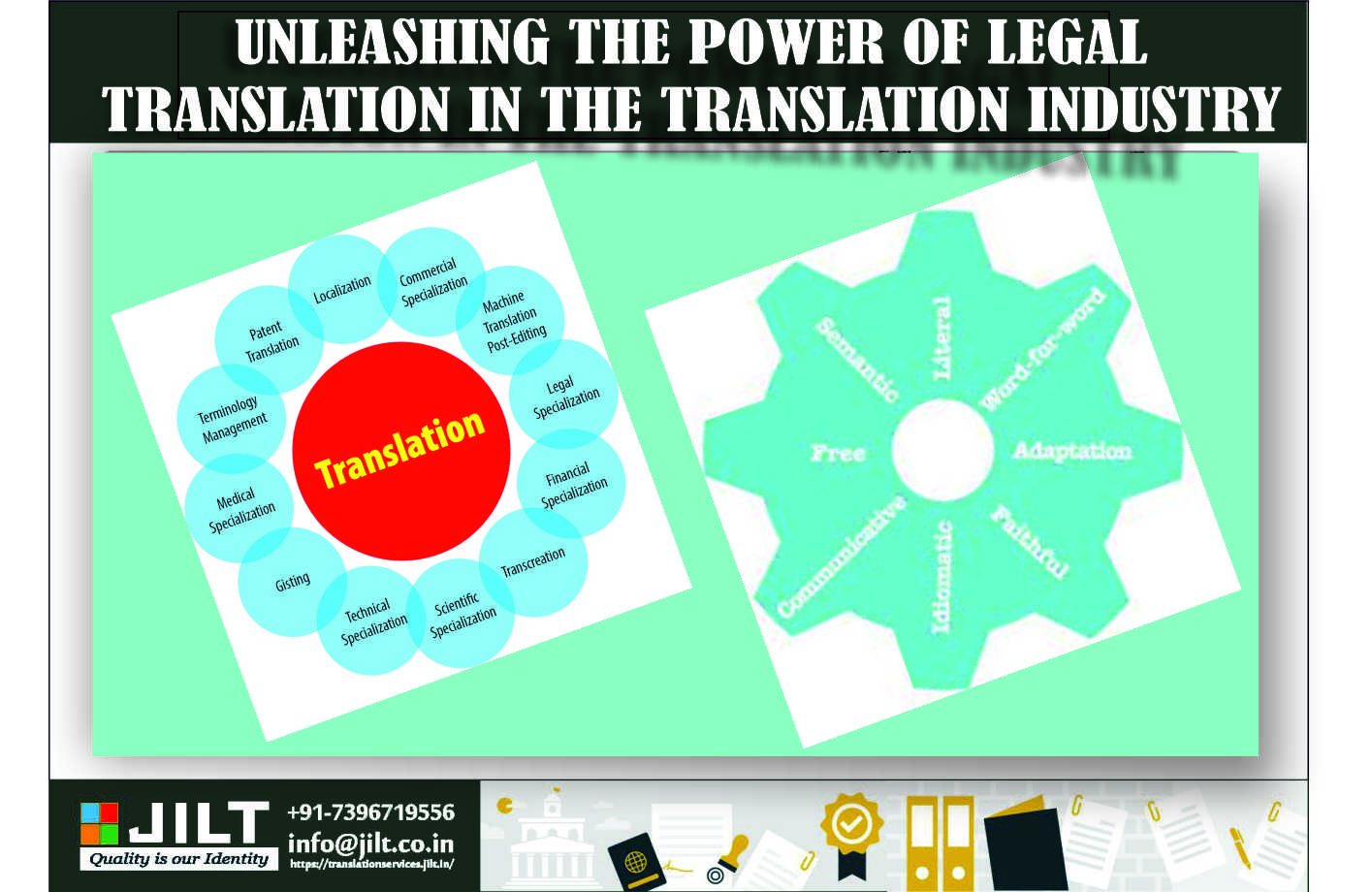
UNLEASHING THE POWER OF LEGAL TRANSLATION IN THE TRANSLATION INDUSTRY
by Dr. Abu Mazhar Khalid Siddique - January 27, 2024
Legal translators face unique obstacles in the intricate field of legal translation, which calls for their undying devotion to accuracy and competence. Legal translators, as intermediaries between different legal systems, must master the complexities of language, cultural differences, and the ever-changing terrain of law. Being fluent in both the source and destination languages is essential in this niche profession, but so is an in-depth knowledge of the complex legal jargon.
The need to protect the authenticity and meaning of legal documents is central to these difficulties. The level of detail required goes much beyond literal wording and probes into the complex web of cultural subtleties and jurisdictional peculiarities that define legal systems around the world. A single misunderstanding could have far-reaching implications, making legal translation an exercise in meticulousness whether dealing with patents, court procedures, contracts, or any other type of legal document.
In addition, the process becomes much more complex due to the unwavering need for anonymity. Translators are required to maintain strict confidentiality requirements when working with legal papers, as they frequently include sensitive information. This calls for a fine line to be drawn between being open and honest in language use and protecting sensitive information with legal implications.
Within this complex environment, legal translators stand out as experts in both language and the law, able to determine the truthfulness of legal documents. In addition to being fluent in the target and source languages, their knowledge of the legal systems in both countries is extensive. In order to provide translations that are both legally relevant and linguistically accurate, translators must keep up with legislative developments as legal systems are constantly being refined.
Accuracy and specialization are prerequisites for success in the legal translation industry. Recognizing that even the smallest difference could have significant legal ramifications, every document is subjected to thorough examination. As a result, legal translation is an essential part of the interconnected web of law that exemplifies the meeting point of language proficiency, cultural awareness, and legal acumen.
Legal Terminology Precision:
Accurate legal translation is a complex procedure that requires extensive knowledge of legal terminology. The translator's knowledge of the source and target legal vocabularies is just as important as their command of the language(s). The precise meaning and ramifications of each legal phrase depend on the particular context in which it is used. Word choice and the retention of intended legal significance both necessitate painstaking attention to detail. The correctness of translated documents greatly affect legal decisions, thus it is crucial to have a thorough understanding of the intricacies of different legal systems. In this field, being well-versed in legal terminology is essential, since it allows translators to deftly negotiate the complex web of legalese.
Cultural Nuances:
Because there are so many different legal systems and cultural conventions, it is crucial for legal translators being able to navigate cultural nuances. In order to guarantee that legal communication is clear, translators play the role of cultural mediators and are charged with the delicate duty of bridging these subtle gaps. Because cultural differences have such a significant effect on legal interpretations, a skilled translator needs excellent language skills in addition to an acute understanding of how different cultures shape legal systems. To ensure that translated content is correct and contextually relevant within varied cultural environments, this nuanced understanding is crucial for maintaining the integrity of legal documents.
Jurisdictional Differences:
Having a deep grasp of the differences between jurisdictions is necessary in order to successfully navigate the complex landscape of legal translation. It is necessary for translators have a full awareness of the unique laws and practices that are inherent in both the source language and the target language because the legal systems employed in different jurisdictions are drastically different from one another. To ensure that translated documents not only accurately express legal content but also conform seamlessly with the intricate frameworks and practices that distinguish different legal jurisdictions, it is of the utmost importance to have a mastery of these nuances. When it comes to maintaining the credibility and significance of legal translations, having expertise in this field is quite necessary.
Document Formatting:
Maintaining the exact format and structure of legal documents is a crucial aspect of the translation process, necessary for ensuring their legal authenticity. Legal papers conform to precise formatting norms that enhance their lucidity and enforceability. Translators bear the duty of accurately reproducing this framework in the target language to guarantee that the translated document retains its legal validity and preserves its intended influence. The document's integrity may be compromised if there are any deviations in format, highlighting the importance of translators being proficient not only in language accuracy but also in the fine aspects of legal document design.
Confidentiality and Privacy:
When translating legal documents, privacy and confidentiality are of the utmost importance. Legal materials often comprise confidential information, and translators are responsible for ensuring that this data remains secure and unaltered. It is critical to uphold rigorous confidentiality protocols in order to safeguard sensitive legal data against unauthorized access or disclosure. In addition to ensuring linguistic precision, translators are obligated to incorporate strong security protocols during the entirety of the translation procedure. Through the implementation of stringent confidentiality measures, translators play a pivotal role in safeguarding the attorney-client privilege, preserving the confidence of stakeholders, and upholding the ethical principles that are intrinsic to the legal profession. The significance of this obligation highlights the critical function that translators perform in upholding the confidentiality and privacy that are fundamental to the ethical and professional norms of the legal profession.
Specialization:
Documents such as contracts, patents, and court documents are examples of the various fields that fall under the umbrella of the multidimensional field of legal translation. In order to achieve precision in translation, it is not enough to simply have linguistic proficiency; one must also have specialist understanding in the relevant legal sector. It is necessary for translators to delve into the complexities of each legal genre, gaining a mastery of the specific terminologies and contextual nuances that define each of these genres. When it comes to translating elaborate contract language or decoding complex patent terminology, having a thorough understanding of the relevant legal subject is of the utmost importance. Not only does specialization guarantee linguistic accuracy, but it also guarantees the preservation of the many legal contexts. This helps to encourage translations that are accurate and contextually appropriate, which is vital for the effectiveness and impact of legal documents.
Certification Requirements:
Within the domain of legal translation, certified translations are required for official recognition of particular documents. Translators entrusted with this duty are required to have an exhaustive comprehension of the certification prerequisites that are intrinsic to both the source and target legal systems. In addition to linguistic precision, certification requires strict adherence to particular legal procedures and formats. Translators must possess the necessary expertise to navigate the complexities inherent in the certification standards of each jurisdiction, thereby guaranteeing that the translated document satisfies the necessary criteria for legal validity. The capacity to effectively combine linguistic expertise with a sophisticated understanding of certification protocols is critical, as it ensures that the translated document possesses the requisite legal validity, thereby promoting its recognition and acceptability in various official settings.
Legal System Changes:
Within the ever-evolving domain of legal translation, the translators' responsibility to stay updated on modifications to legislation and regulations is underscored by the continuous evolution of legal systems. Due to the fact that legal frameworks in both the source and target languages are susceptible to change, maintaining knowledge is equivalent to guaranteeing precise translations. It is imperative that translators participate actively in continuous professional development by closely monitoring legal updates, amendments, and precedents that have the potential to influence the translation process. This dedication surpasses mere linguistic aptitude and necessitates an intricate comprehension of the ever-changing legal subtleties across various jurisdictions. Through remaining cognizant of developments in the legal system, translators not only maintain the utmost precision but also enhance the overall efficacy and pertinence of translated legal documents in the present-day legal milieu.
Dual-Language Legal Expertise:
To get a high level of proficiency in legal translation, one must possess not just fluency in two languages, but also a deep understanding of legal terminology and concepts in both languages. Translators must have a comprehensive comprehension of both the linguistic complexities and the legal principles embedded in the texts. By possessing a dual competence, we are able to provide precise and contextually appropriate translations that effortlessly maintain legal subtleties across different languages. Translators who possess expertise in both languages and legal frameworks are able to effectively negotiate the intricacies of legal terminology. This proficiency is crucial for ensuring the accuracy and authenticity necessary to effectively communicate legal concepts in varied linguistic and cultural contexts.
Quality Assurance:
In the field of legal translation, ensuring careful quality assurance is of utmost importance. Thorough proofreading procedures are essential since even the smallest mistake might have significant legal ramifications. The accuracy and reliability of legal documents depend on the exactness of language and the process of interpretation. Legal translators conduct thorough examinations to ensure that every term, phrase, and contextual subtlety harmonizes flawlessly with the intended legal significance. The dedication to quality assurance not only reduces the possibility of misunderstanding but also maintains the utmost levels of precision and dependability in legal translations. The thorough evaluation process is a necessary precaution, recognizing the seriousness of legal consequences linked to any potential language mistake.
Conclusion:
To summarize, the significant influence of legal translation in the translation sector cannot be exaggerated. Legal translators are essential in promoting cross-cultural legal communication by ensuring linguistic accuracy and legal authenticity. The complex and constantly changing nature of legal language, cultural subtleties, and growing legal frameworks require a distinct set of skills and a strong dedication to achieving high standards. Legal translation plays a crucial role in the interconnected global legal system by utilizing the expertise of bilingual legal professionals and implementing rigorous quality control measures. The importance of legal translators in guaranteeing precise, culturally aware, and legally valid translations is becoming more crucial as international legal transactions and cooperation become more intricate. Legal translation plays a crucial role in bridging the gap between different legal systems and facilitating comprehension and adherence in the complex world of global legal communication.
Our organization employs native-speaking translators who can provide certified translation services in any language. We provide translation services in English (Urdu), Arabic (Spanish), German (French), Persian (Iranian), French (Italian), Japanese (Korean), Russian, and any other Indian or local language. Expert proofreaders at our company will inspect the translation. We also provide a courier service to deliver completed documents to our clients.
- Also Read :- GUIDE TO RECEIVE A DEATH CERTIFICATE IN TAMIL NADU STATE AND PROCESS OF TRANSLATION
- Also Read :- GLOBAL CELEBRATIONS: INTERNATIONAL MOTHER LANGUAGE DAY INSIGHTS
- Also Read :- Documents Required and need to be Translated from German into English
- Also Read :- Employment reference translations (JILT - Certified Translation Services)
- Also Read :- WHY YOU ARE REQUIRED TO TRANSLATE A BIRTH CERTIFICATE?
- Also Read :- Penal clearance certificate translations (JILT - Certified Translation Services)
- Also Read :- Export permit translations (JILT - Certified Translation Services)
- Also Read :- NATIONAL TRADE CERTIFICATE: EMPOWERING SKILLED WORKFORCE AND FUELING ECONOMIC GROWTH
- Also Read :- VACCINE REGISTRATION IN SAUDI ARABIA: HOW TO REGISTER FOR RESIDENTS & VISITORS
- Also Read :- PROCESS OF OBTAINING A DEATH CONFIRMATION LETTER FROM THE Indian Embassy IN Saudi Arabia.
Search
Categories
Archives by Month
Popular Blog
QUICK TRANSLATION QUOTE
Need help with a translation?
Get in touch with us
Whether you have a specific project you want to discuss, need a translation quote or simply want to discuss your requirements, do not hesitate to get in touch with us.











Social Networks